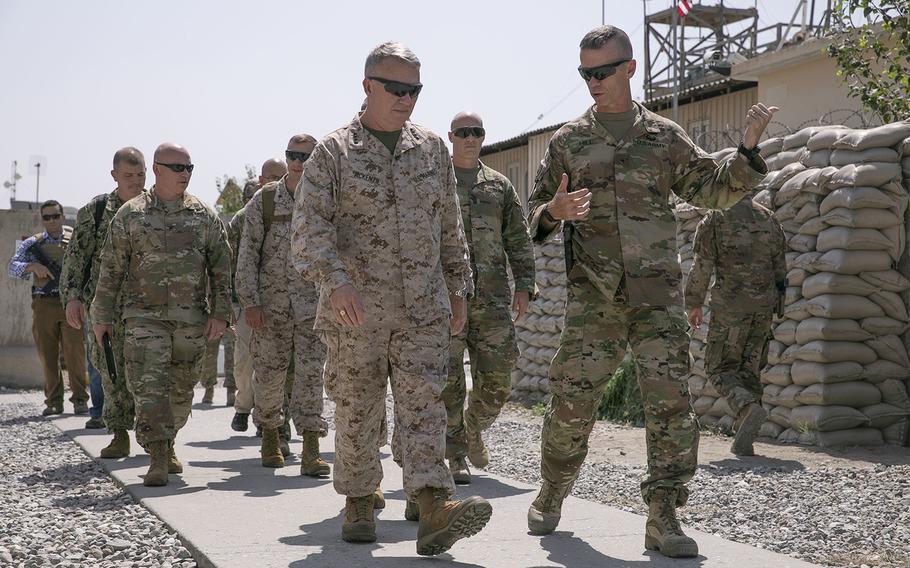
U.S. Army Brig. Gen. Donn H. Hill, front right, speaks with U.S. Marine Corps Gen. Kenneth F. McKenzie Jr., front left, the commander of U.S. Central Command, during McKenzieâ's visit in Jalalabad, Afghanistan, in September 2019. (Roderick Jacquote/U.S. Marine Corps)
WASHINGTON — The troop drawdowns in Afghanistan and Iraq planned to be completed by mid-January will restrict the remaining forces in both countries and limit how the United States assists with future operations there, the top general for U.S. Central Command said Thursday.
“We’re just going to have to be very careful and focused when we do it,” Marine Gen. Frank McKenzie said during a virtual event with DefenseOne, a news organization.
On Nov. 17, acting Defense Secretary Christopher Miller announced President Donald Trump had decided to reduce U.S. forces in Iraq and Afghanistan by Jan. 15, just five days before President-elect Joe Biden is sworn into office.
The force reduction will leave roughly 2,500 troops in Afghanistan and 2,500 in Iraq as both countries continue to see violence against government forces and civilians by terrorist groups such as the Islamic State and the Taliban.
With fewer troops, the work of advising and assisting Afghan forces with counter-terrorism operations will be done “at a higher level,” McKenzie said.
“We will have to be very careful and very smart how we pick and choose where we go and where we don’t go. And the margins will be less, but we believe it still will enable us to carry out our core objective” of preventing ISIS and al-Qaida from attacking the U.S. or other partner countries from Afghanistan, the general said.
The United States will not have trouble getting down to fewer than 3,000 in Afghanistan by January, including the removal of excess equipment, McKenzie said. Even with the drawdown, troops will still work with allies and partners to carry out their mission in Afghanistan and Iraq.
“One point I want to make is our NATO and coalition partners are going to be with us, even as we go down. In fact, there will be more coalition and NATO forces in Afghanistan than U.S. forces when we arrive at this number,” he said.
McKenzie said the NATO mission in Iraq is expected to expand as partner countries bring in more people to the country to work with the United States after the drawdown.
While the Taliban has stopped attacks on American or coalition forces since the peace agreement was signed in February, McKenzie said he is still concerned about attacks on Afghan forces, which have also resulted in civilian casualties. There is also still no process for determining whether the Taliban is not allowing ISIS or al-Qaida from operating within its territory, he said.
McKenzie said he hopes the ongoing peace negotiations between the government of Afghanistan and the Taliban will help reduce the violence, however, the coalition will still be there to help the Afghan security forces defend themselves.
“We believe that is a practical way forward,” he said.